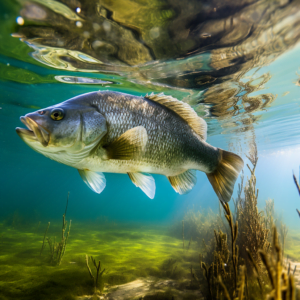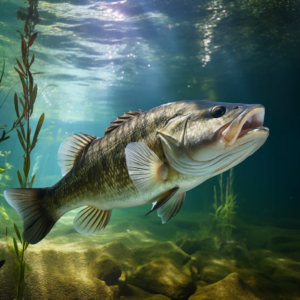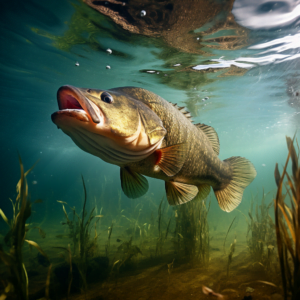So, have you ever wondered if bass is a strong tasting fish? You know, like when you’re at a restaurant and you see bass on the menu, but you’re not quite sure if it’s going to be too overpowering for your taste buds? Well, let’s dive into this topic and find out more!
Bass, my friend, is indeed a fish with a distinct taste. It has a rich, slightly earthy flavor that can vary depending on the type of bass and how it’s prepared. Some people describe it as being similar to trout or salmon, but with its own unique twist. Now, whether you find it strong or not really comes down to personal preference. Some may find it to be just right, while others might find it too overpowering.
In our upcoming article, we’ll explore the different types of bass and how they differ in taste. We’ll also discuss the best ways to cook and season bass to enhance its flavor, so you can enjoy it to the fullest. Whether you’re a seafood enthusiast or just curious about trying new flavors, this article will definitely have something for you. So, stay tuned for more insights on the taste of bass and how to make it a delicious addition to your meals!
Introduction
When it comes to choosing the right fish for your meal, flavor plays a crucial role. Some people prefer mild-tasting fish, while others enjoy a stronger, more distinct flavor. If you are someone who appreciates bold and robust flavors, bass fish might just be the perfect choice for you. In this article, we will explore the characteristics, flavor profile, culinary uses, health benefits, and sustainability of bass fish. Let’s dive in!
| Factor | Details |
|---|---|
| Species of Bass | Largemouth Bass, Smallmouth Bass, Spotted Bass, Striped Bass |
| Habitat | Freshwater environments: lakes, rivers, reservoirs |
| Diet | Varied: smaller fish, insects, crustaceans, small mammals |
| Flavor Profile | Mild, slightly sweet, subtly earthy |
| Cooking Methods | Grilling, baking, pan-frying, others |
| Popular Dishes | Fried bass with cornmeal batter, bass gumbo, bass alla Livornese, bass in salt crust (Italy), etc. |
| Health Benefits | High-quality protein, omega-3 fatty acids, vitamins B6 and B12 |
| Fishing Regulations | Size limits, bag limits, seasonal closures |
| Alternative Fish | Mackerel, Salmon, Sardines |
| Culinary Trends | Fusion of diverse global flavors, sustainability, health awareness |
What is Bass Fish?
Bass fish is a common name used to refer to various species of fish belonging to the family of Centrarchidae. These fish are freshwater species and are highly sought after by both anglers and seafood enthusiasts. Bass fish are known for their voracious appetite, and their availability makes them a popular choice for recreational fishing and culinary purposes.
Different Types of Bass Fish
The term “bass fish” encompasses several different species, each with its own unique characteristics and flavor profiles. Some of the most well-known bass fish include largemouth bass, smallmouth bass, spotted bass, and striped bass. Each of these species differs in size, appearance, and habitat, but they all share a reputation for their delicious taste.
Culinary Significance of Bass Fish
Bass fish holds a prominent place in the culinary world, thanks to its versatile nature and delightful flavor. Its mild yet distinct taste makes it a favorite among chefs, who love to experiment with different cooking techniques and flavor combinations. Bass fish is often featured in various cuisines and is regarded as a prized ingredient in many traditional dishes around the world.
Characteristics of Bass Fish
Physical Appearance of Bass Fish
Bass fish can be easily recognized by their elongated bodies, sleek scales, and a variety of striking colors. Largemouth bass, for example, has a greenish-brown body with a distinctive dark patch on its side. The smallmouth bass, on the other hand, features a more bronze color and vertical bars running along its body. These physical attributes make bass fish a visually appealing species.
Habitat and Distribution of Bass Fish
Bass fish are primarily found in freshwater environments, including lakes, rivers, and reservoirs. They thrive in temperate climates and prefer calm, clear waters with ample vegetation for cover. Bass fish are native to North America but have been introduced to various regions worldwide due to their popularity among anglers and their excellent adaptability to new environments.
Feeding Habits of Bass Fish
Bass fish are predatory by nature and have a diverse diet. They are opportunistic feeders, meaning they will consume whatever prey is available in their environment. Bass fish primarily feed on smaller fish, insects, crustaceans, and even small mammals. This varied diet contributes to the unique flavor of bass fish and influences its culinary significance.
Flavor Profile of Bass Fish
Defining the Taste of Bass Fish
Bass fish is often described as having a mild, yet distinct flavor. Its taste is characterized by a delicate sweetness and a subtle earthiness. The flavor of bass fish is not overpowering, which makes it a versatile ingredient that can be incorporated into various dishes and flavor combinations.
Is Bass Fish Considered to be Strong Tasting?
While bass fish does have a distinct taste, it is not generally considered to be strong. However, taste perception can vary from person to person. Some individuals may find the flavor of bass fish to be more pronounced compared to other milder fish species. If you enjoy the taste of fish and prefer a flavor that is more assertive than mild, bass fish may be just what you’re looking for.
Factors That Impact the Flavor of Bass Fish
The flavor of bass fish can be influenced by several factors, including the fish’s diet, habitat, and cooking method. Fish that feed on a diet rich in aquatic vegetation may have a slightly grassy or herbaceous taste. Similarly, bass fish caught from different habitats may exhibit subtle flavor variations. The cooking method used can also greatly impact the final flavor profile of bass fish, allowing for customization to suit individual preferences.
Culinary Uses of Bass Fish
Popular Cooking Methods for Bass Fish
Bass fish can be prepared using a myriad of cooking techniques, each bringing out unique flavors and textures. Grilling, baking, pan-frying, and steaming are all popular ways to cook bass fish. Grilling imparts a smoky flavor and adds a little char to the fish, while baking ensures a moist and tender result. Pan-frying creates a crispy exterior, and steaming preserves the delicate flavors of the fish.
Traditional Dishes Featuring Bass Fish
Bass fish is a prized ingredient in various traditional dishes around the world. In the southern United States, for example, largemouth bass is often used in classic dishes like fried bass with cornmeal batter, bass gumbo, or blackened bass. In Italy, bass fish is commonly used in dishes like bass alla Livornese or bass in salt crust. These dishes showcase the versatility of bass fish and its ability to adapt to different culinary traditions.
Pairing Bass Fish with Complementary Flavors
To enhance the flavor of bass fish, it is often paired with complementary ingredients and flavors. Lemon, garlic, and fresh herbs like dill and parsley are popular choices for adding brightness and freshness to bass fish dishes. Butter or olive oil can be used to coat the fish and provide a rich and velvety texture. Spices like paprika, cayenne pepper, or blackened seasoning can add a hint of heat and complexity to the flavor profile.
Health Benefits of Bass Fish
Nutritional Profile of Bass Fish
Bass fish is not only delicious but also offers several health benefits. It is a good source of high-quality protein, essential vitamins, and minerals. Bass fish is low in calories and contains negligible amounts of carbohydrates, making it a suitable option for those following a low-carb or keto diet. It is also low in saturated fat and a rich source of omega-3 fatty acids.
Omega-3 Fatty Acids in Bass Fish
Omega-3 fatty acids are polyunsaturated fats that play a crucial role in maintaining heart health, reducing inflammation, and supporting brain function. Bass fish, especially the wild-caught varieties, are packed with these essential fatty acids. Consuming bass fish regularly can contribute to a balanced omega-3 fatty acid intake and promote overall well-being.
Impact of Bass Fish Consumption on Health
Incorporating bass fish into your diet can have numerous health benefits. The omega-3 fatty acids found in bass fish have been linked to a reduced risk of heart disease, improved cognitive function, and decreased inflammation. Additionally, bass fish is a good source of vitamins B6 and B12, which play vital roles in energy production and maintaining a healthy nervous system.
Sustainability and Fishing Regulations
Fishing Practices for Bass Fish
As bass fish populations are highly valued for both recreational and culinary purposes, responsible fishing practices are crucial to ensure their sustainability. Many anglers practice catch and release, allowing the fish to be returned to the water unharmed. This helps maintain healthy bass fish populations and promotes conservation efforts.
Environmental Considerations
The environmental impact of fishing for bass fish is relatively low compared to other commercially important species. However, as with any fishing activity, it is essential to be mindful of the environment and take measures to minimize negative impacts. Avoiding overfishing, protecting delicate habitats, and adhering to local fishing regulations are essential to maintain a balanced ecosystem.
Fishing Regulations and Management
Fisheries management organizations and governmental bodies implement regulations and restrictions to ensure the long-term sustainability of bass fish populations. These regulations may include size limits, bag limits, and seasonal closures to protect breeding stocks and promote the growth of younger fish. Compliance with these regulations is vital to safeguard bass fish populations and maintain a healthy ecosystem.
Alternative Fish with Strong Tastes
Comparison of Bass Fish to Other Strong-Tasting Fish
While bass fish has a distinct flavor, there are several other strong-tasting fish options available. Fish like mackerel, salmon, and sardines have bolder flavors and are known for their distinctive taste profiles. These fish often have a rich, oily texture and offer a more pronounced flavor experience compared to bass fish.
Exploring Flavor Profiles of Alternative Fish
Each strong-tasting fish has its own unique flavor profile, offering a range of culinary possibilities. Mackerel, for instance, has a rich, smoky flavor that pairs well with bold spices and sauces. Salmon boasts a buttery texture and a slightly sweet taste, making it a favorite for many seafood lovers. Sardines have a robust and briny flavor that can add a punch to various dishes.
Diverse Culinary Applications
Just like bass fish, alternative strong-tasting fish are highly versatile in the kitchen. They can be utilized in a variety of dishes, from grilled fillets and fish tacos to smoked fish dips and pasta recipes. The distinctive flavors of these fish lend themselves well to marinades, glazes, and sauces, allowing for endless culinary creativity.
Tips for Cooking Bass Fish
Preparation Techniques for Bass Fish
Before cooking bass fish, it is essential to properly clean and fillet the fish. Remove any scales, gut the fish, and carefully remove the bones. This will ensure an enjoyable dining experience without any unwanted surprises. Marinating the fish for a short period before cooking can also help enhance the flavor and tenderness.
Cooking Methods to Enhance or Balance the Taste
The choice of cooking method can significantly impact the taste of bass fish. Grilling or baking can enhance the natural flavors of the fish, while pan-frying can add a crispy texture. Additionally, incorporating acidic ingredients like lemon juice or vinegar can help balance out the richness of the fish and brighten the overall flavor profile.
Seasoning and Marinade Suggestions
When it comes to seasoning and marinades for bass fish, the options are endless. A simple yet flavorful combination includes salt, pepper, and a squeeze of fresh lemon juice. For a bolder taste, experiment with herbs like thyme or rosemary, or incorporate spices like paprika or cayenne pepper. Marinating the fish in a mixture of olive oil, garlic, and herbs can infuse the flavors and tenderize the flesh.
Consumer Preferences and Culinary Trends
Regional Variations in Bass Fish Consumption
Bass fish consumption varies across different regions and cultures. In the United States, bass fish is beloved in southern cuisine, where it is a staple ingredient in many traditional dishes. In Europe, bass fish is highly regarded in Mediterranean cuisine and is often featured in Italian, French, and Spanish recipes. Consumer preferences for strong-tasting fish can also differ based on cultural traditions and personal taste preferences.
Fusion Cuisines Incorporating Bass Fish
With the rise of fusion cuisine, bass fish has found its way into various global culinary creations. Chefs and home cooks alike are experimenting with combining bass fish with flavors and techniques from different culinary traditions. Whether it’s a fusion of Asian and Latin American flavors or a blend of Mediterranean and Middle Eastern influences, the versatility of bass fish allows for endless possibilities in the kitchen.
Changing Consumer Perceptions and Demands
As consumer awareness about sustainability and health benefits grows, so does the demand for fish that offer both flavor and positive environmental impact. Bass fish, with its mild yet distinct taste and sustainable fishing practices, is well-positioned to meet these evolving consumer preferences. Incorporating bass fish into your meals not only provides a delightful culinary experience but also supports responsible fishing practices and environmental conservation.
Conclusion
In conclusion, bass fish is a delicious and versatile option for those seeking a flavorful seafood experience. While it may not be considered a “strong-tasting” fish by everyone, its unique flavor profile sets it apart from milder species. Bass fish offers a delicate sweetness and an earthy undertone that lends itself well to a wide range of culinary uses. Whether you prefer grilling, baking, or pan-frying, bass fish can be prepared in various ways to suit your taste preferences. Moreover, its health benefits and sustainable fishing practices make bass fish an appealing choice for conscious consumers. So, the next time you’re seeking a fish with character, consider giving bass fish a try. You won’t be disappointed by its delightful taste and culinary possibilities.




